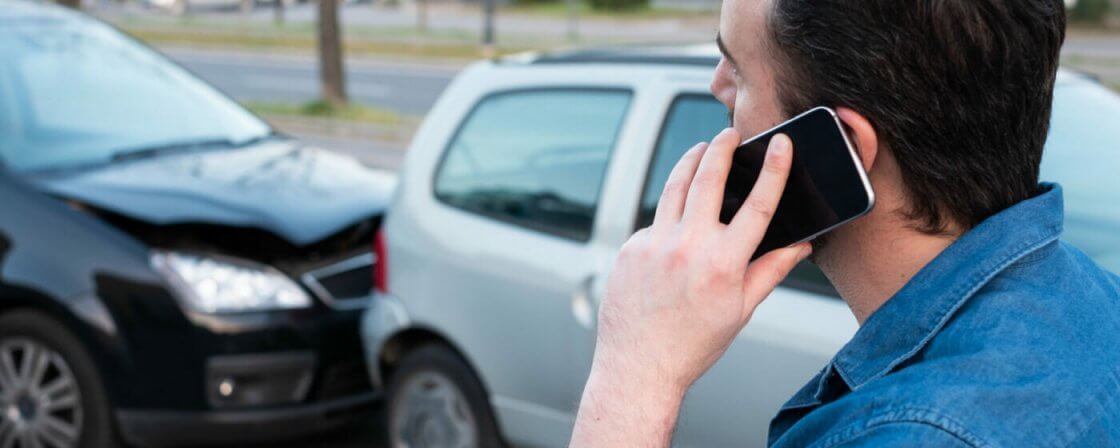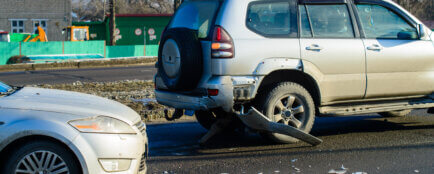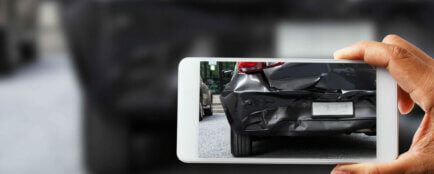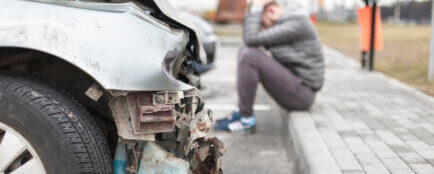I was directly involved in an accident as a driver
The first thing you should think about is the safety of yourself, your loved ones and other road users. If you are able to do so (i.e. you are not seriously injured, for example), you must first of all secure your vehicle. Switch off the engine, wear a reflective vest, which is part of the compulsory equipment, and place a warning triangle at least 50 metres from the vehicle (at least 100 metres on the motorway). If you are not alone in the car, passengers should also wear their vests and be taken to safety (safely behind the barriers in the event of an accident on the motorway). If anyone in your car or another road user is injured, call the emergency services.
Although you are no doubt in shock, taking a drink to take courage now is not the best idea. On the other hand, you should refrain from consuming alcoholic beverages if it can be assumed that you will be examined to see if you have been drinking before driving (and this is pretty much always possible in a car accident).
Consequently, you should be cooperative to investigate the circumstances of the accident, not only with the police who may be called, but also with the other driver with whom the collision occurred. Together you should draw up a record of the accident.
If the other driver accuses you of being at fault, do not hesitate to consult a lawyer about the correct course of action.
Are you solving a similar problem?
Have you been involved in a car accident and are you dealing with a legal problem?
Take the crucial extra step – once you’ve done everything you can after the accident, there’s only one thing left to do: defend your claim for damages or injury. And that’s not something you should risk without a professional. We’ll assess your case and suggest a course of action within 48 hours. A lawyer can handle everything from calling the at-fault party or insurance company to filing a lawsuit if necessary, keeping you informed.
I want help with my problem
- When you order, you know what you will get and how much it will cost.
- We handle everything online or in person at one of our 6 offices.
- We handle 8 out of 10 requests within 2 working days.
- We have specialists for every field of law.
I’m driving or walking by and I see a traffic accident
Even if you did not directly cause the accident and are just in the vicinity, it is your duty to help the injured. If there are such persons, give them first aid and always call the ambulance and the police.
Failure to render assistance
Remember that rendering assistance is not your goodwill but a direct legal obligation. If you do not give help to the injured in the above cases, you are very likely to commit one of these offences:
Failure to render assistance by the driver of a motor vehicle – this offence is committed by the driver of a motor vehicle who was involved in a road traffic accident and failed to render necessary assistance to the injured persons when he or she could have done so without danger to himself or herself or another. In such a case, it is irrelevant whether the driver was directly at fault for the accident, but that he or she was involved in the accident in any way (e.g. even if another driver failed to give way and hit him or her).
The means of transport in question does not necessarily have to be a car, but can be a scooter, bicycle or anything similar.
You don’t necessarily need to have a paramedic course to help; calling an ambulance counts as a minimum. On the other hand, having some basic knowledge of providing medical assistance will certainly make you feel more confident in traffic. Perpetrators of this offence can face up to five years imprisonment.
Failure to render assistance – if a seriously injured person intentionally fails to render necessary assistance to other persons in the vicinity of the accident, even though they can do so without danger to themselves or another, they commit an offence punishable by up to two years imprisonment. If the person who is obliged to render assistance by the nature of his or her occupation (doctor, paramedic, etc.) fails to do so, then he or she faces a ban on his or her activity or up to three years’ imprisonment.
Offences related to traffic accidents
If you do not respect the above-mentioned obligations imposed by law on drivers in the event of a traffic accident (e.g. failing to stop the vehicle, failing to report the accident to the police if necessary, failing to provide assistance, etc.), you are committing traffic offences. These are then subject to various penalties under the Road Traffic Act.
If you drive away from an accident in which no injuries were sustained, you are usually liable to a fine of between CZK 2,500 and CZK 5,000, 7 points in the points system and a driving ban. In more serious cases (repeated infringements, major damage, refusal to cooperate), the penalty can be higher – up to CZK 25,000. If serious bodily injury or death occurs, it is a criminal offence with a possible prison sentence of up to 6 years.
When is it necessary to call the police to a traffic accident?
Are you saying to yourself that the ideal thing to do in an accident is to come to some sort of agreement with the other party and then leave the rest to the insurance companies? There are cases where that’s not enough. You must call the police to the accident if:
- There are injuries or deaths.
- There is damage to third party property (not necessarily to specific persons, but for example damage to public lighting, furniture, traffic signs, or environmental damage).
- The amount of damage to some of the damaged vehicles is more than two hundred thousand crowns. This includes the items transported, so if you have “only” spilled glass, which irrevocably destroyed your favourite Birkin worth 300,000 crowns, then calling the police is the right thing to do. If you’re not sure of the amount of damage, then you’d better also call.
- The parties involved in a traffic accident cannot restore the flow of traffic on their own.
If the damage is less than CZK 200,000, but the parties have not agreed together on who caused it, it is theoretically not necessary to call the police, but only to indicate this on the form. However, the Police of the Czech Republic itself recommends calling on its website.
What about handling the car?
The basic rule is: do not do anything to the car until the police arrive. This need not be followed only if it is obvious that the police will not be called, or if you move the car, for example, to free other people or to allow emergency vehicles to pass. If you already have to move the car, try to mark the original position, for example with chalk or coloured spray paint, or take photographs of it from different sides. A photo is recommended in any case.
Traffic accident record
If there is no reason to call the police, you should in any case make a joint record as the parties involved in the accident. It is generally advisable to use the so-called Euro form provided by your insurance company or you can find it on the website of the Ministry of Transport. Don’t rely on others having it too and print it out twice. The form itself guides you to fill in everything you need to. In any case, the record should include a description of the location of the accident, the time, cause, course of the accident and consequences (damage to vehicles or other damage), identification of the parties and vehicles involved.
The record should be signed by all parties involved and then forwarded to the at-fault party’s insurance company for a claim. Always write down the names and addresses of not only the other drivers but also any witnesses to the accident. If the person at fault does not want to give you their details, at least write down their number plate number, which can be traced later. In any case, it is also advisable to take several photographs of the accident itself and of the surrounding area (traffic signs indicating speed, right of way, etc.).
Contact the assistance service
Always remember to keep an assistance card in your car with the contact details of your insurance company, which you should call especially if your vehicle becomes immobile. In the event that you are not at fault for the accident, assistance services will be covered by the at-fault party’s liability insurance.
Summary
In a traffic accident, the first thing to do is to ensure safety – turn off the engine, put on a reflective vest, place a warning triangle (at least 100 metres on the motorway), take the passenger to safety and give first aid to the injured. The emergency services must then be called and, in the cases provided for by law, the police in the event of injury or death, damage to third party property, damage exceeding CZK 200,000 or if the participants are unable to ensure the flow of traffic. The vehicle is not to be tampered with until the police arrive, with the exception of clearing the passage or releasing persons – the original condition should be recorded by photographs or markings on the road. If the police are not on the scene, a joint accident report should be drawn up, ideally on a Euro form, giving the time, place, cause, course of the accident, details of the participants, vehicles and witnesses, and supported by photographs. Failure to render assistance is a criminal offence, as is hit-and-run, and carries severe penalties including imprisonment. Minor violations can be assessed as a misdemeanor with fines, points and a driving ban. It is always advisable to contact the insurance company’s breakdown assistance service to arrange towing and other assistance, and if you are not at fault, the cost will be covered by the at-fault party’s liability insurance.
Tip for article
Tip: All car owners must pay compulsory third party insurance. You may find this obligation annoying, but it definitely comes in handy if an accident is your fault. It can save you millions of dollars. Find out who exactly is obliged to pay compulsory third party insurance and how to cancel it.
Frequently Asked Questions
When do I have to call the police to a traffic accident?
The police must be called whenever there is injury or death to persons, damage to third party property (e.g. traffic signs, public lighting), when damage to a vehicle or goods exceeds CZK 200,000, or when the parties involved in the accident are unable to ensure the flow of traffic themselves. If you are unsure of the amount of damage, it is advisable to call the police.
What should I do as a driver immediately after an accident?
Stop the engine immediately, put on a reflective vest, place a warning triangle (at least 100 metres from the car on the motorway), move the passenger to safety and secure the accident scene. If persons are injured, administer first aid and call the emergency services.
What should I do if I see an accident but I am not involved?
You have a legal duty to provide assistance to the injured – at the very least, call the ambulance service and the police. Failure to render assistance is a criminal offence punishable by up to two years’ imprisonment, or up to five years for the driver involved in the accident.
Do I always have to make an accident report?
Yes, if the police are not present, it is the responsibility of the parties involved to make a joint report. It is best to use the insurance company’s euro form, which contains all the necessary information. Include the time, place, description of the accident, details of the participants, vehicles and witnesses and attach photographs.
When can I leave the scene of the accident?
You can leave only after you have fulfilled all your duties – provided assistance, secured the accident scene, called the police (if necessary) or written an accident report. Driving away from the scene of an accident is a serious offence or even a criminal offence, punishable by fines, points, disqualification from driving and imprisonment.




